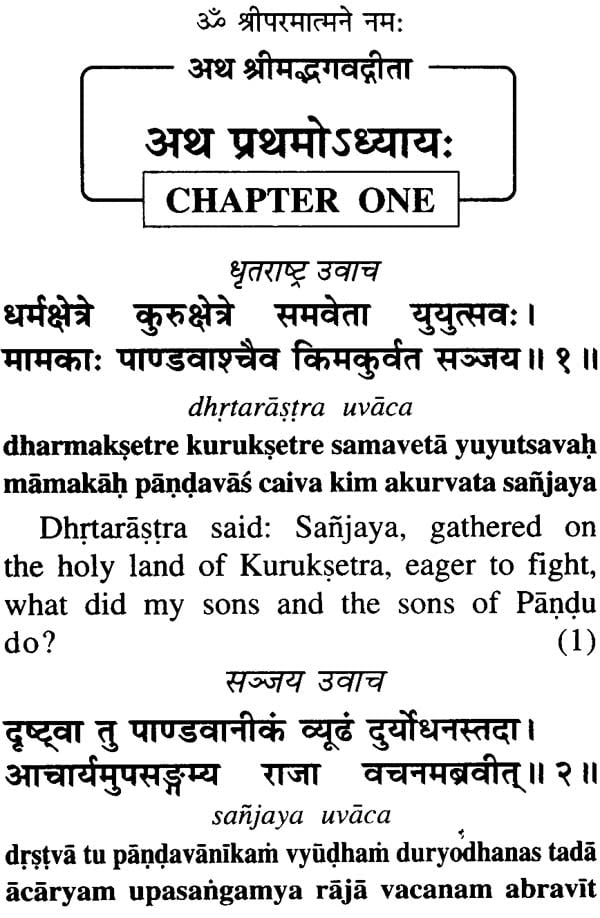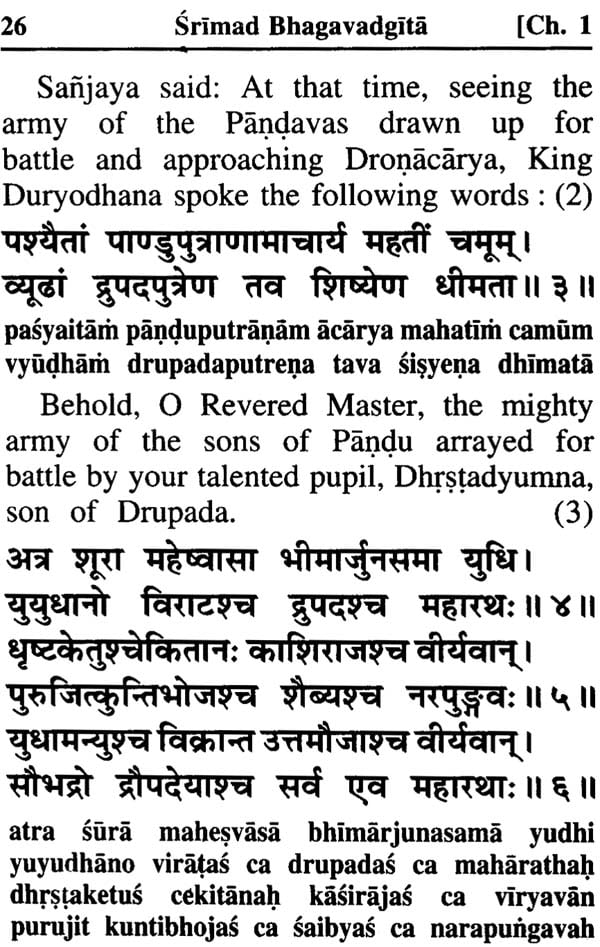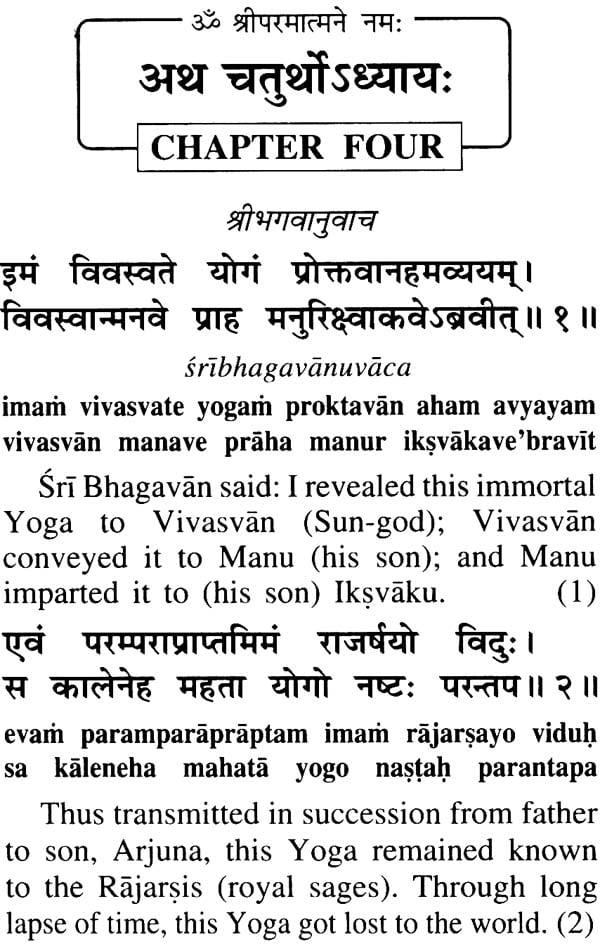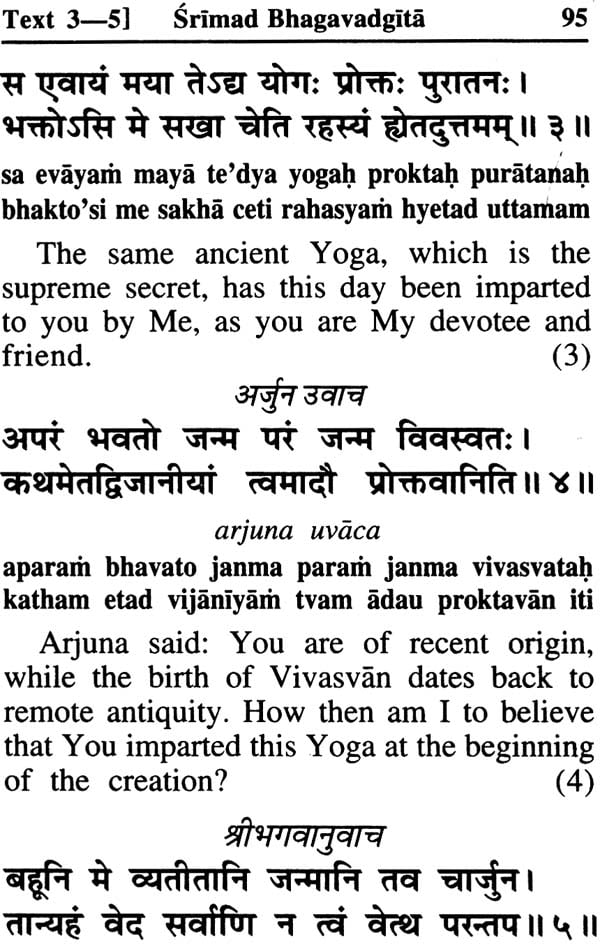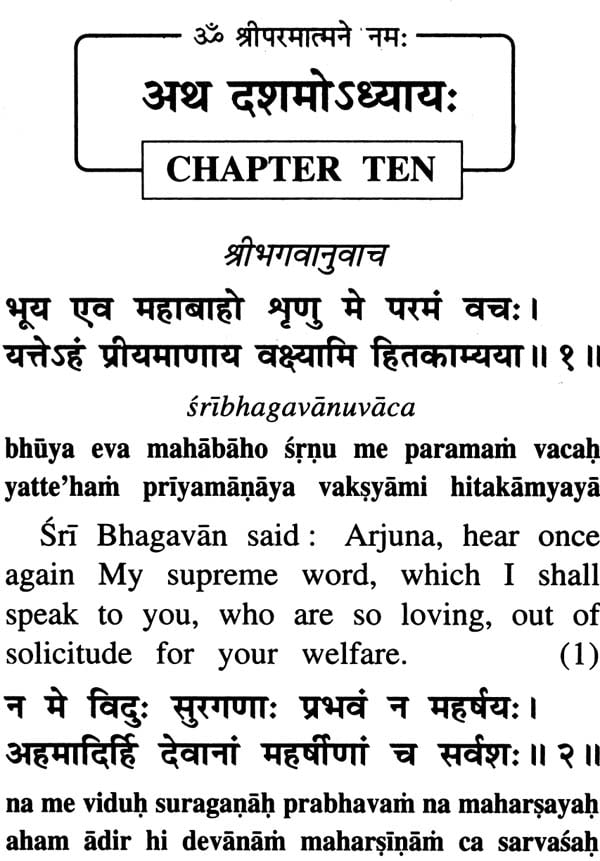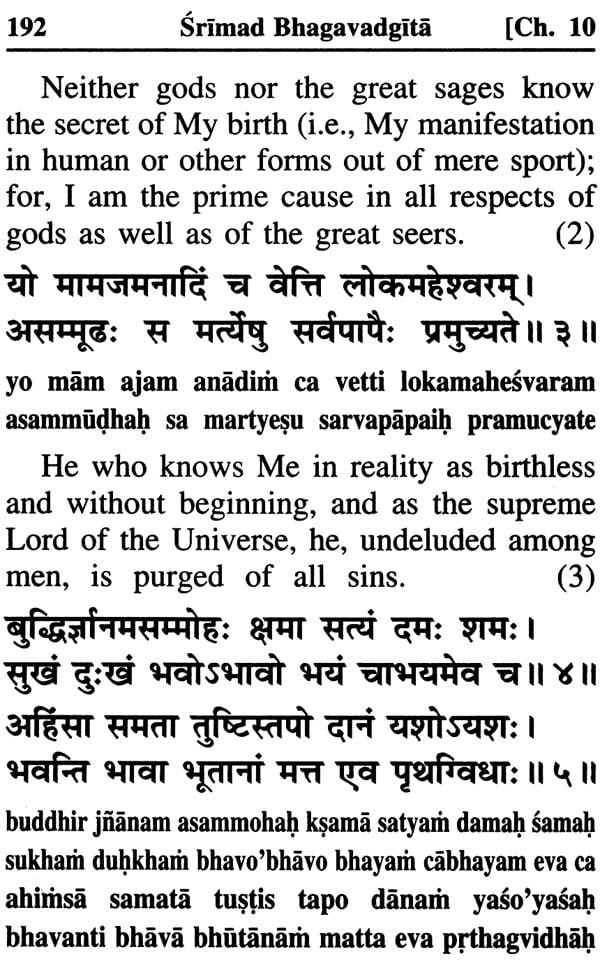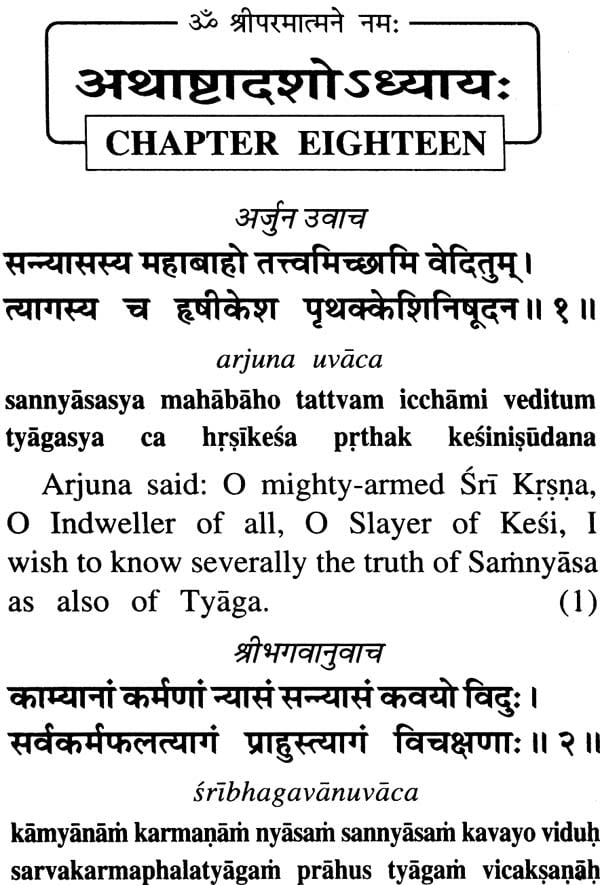
Srimad Bhagavad Gita (With English Translation and Transliteration)
Book Specification
| Item Code: | GPB210 |
| Publisher: | Gita Press, Gorakhpur |
| Language: | Sanskrit Text With Transliteration and English Translation |
| Edition: | 2019 |
| ISBN: | 9788129312495 |
| Pages: | 352 |
| Cover: | Paperback |
| Other Details | 5.5 inch X 4.0 inch |
| Weight | 170 gm |
Book Description
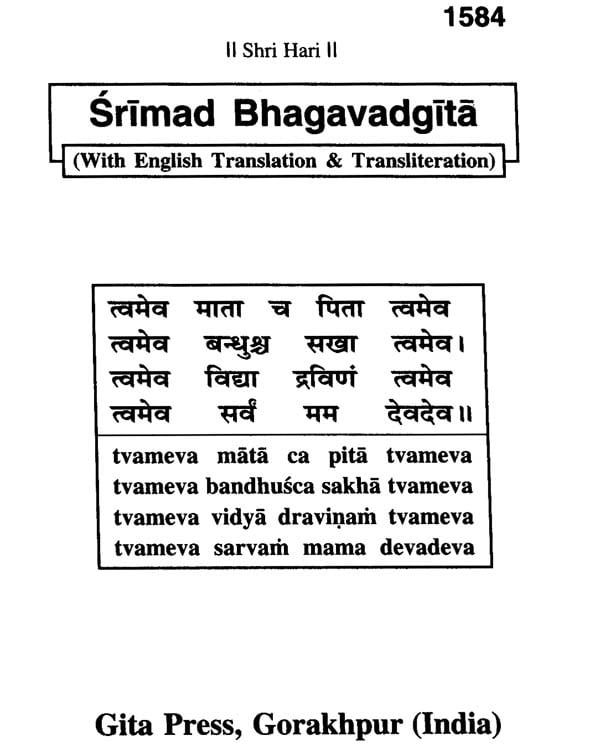
As a book of scripture, the Bhagavadgita has assumed a position of universal interest. Its teachings have gained appreciation not only in India, but far beyond its borders. I Our Gita-Library alone has about 1400 editions of the Bhagavadgita published in 34 different languages including 8 foreign languages.
We are bringing out this edition of the Gita in pocket-size with simple English translation and Roman transliteration of each verse and in a popular form. We trust it will find favour with the English-reading public. We have also published two editions of this book in bolder types in book size for convenience of readers.
The English translation of this edition has been based on the Hindi rendering of the Gita made by Syt. Jayadayal Goyandka and appearing in the Gita- Tattva Number of the Hindi monthly 'Kalyan', published by us. In preparing the present English translation, the translators have made use, every now and then, of other English translations of the Gita, and we express our grateful acknowledgement for the same. In order to add to the utility of this small volume an introduction by Syt. Jayadayal Goyandka and a synopsis of the Gita have been prefixed to the translation.
Several Editions of Gita in Sanskrit, Hindi and other Indian regional languages have been published by us. In English too, several other editions including some with detailed commentary have also been published for in depth study.
Contents
| Subject Discussed | No. of Verse |
| Chapter I entitled | |
| "The Yoga of Dejection of Arjuna" | |
| Description of the principal warriors on both sides with their fighting qualities. | 1-11 |
| Blowing of conches by the warriors on both sides. | 12-19 |
| Arjuna observes the warriors drawn up for battle. | 20-27 |
| Overwhelmed by infatuation, Arjuna gives expression to his faint-heartedness, tenderness and grief. | 28-47 |
| Chapter II entitled | |
| "Sankhyayoga, or the Yoga of Knowledge" | |
| Arjuna and Sri Krsna discussing Arjuna's faint-heartedness. | 1-10 |
| Sankhyayoga (the Yoga of Knowledge) described. | 11-30 |
| The Ksatriya's duty to engage himself in fight. | 31-38 |
| Karmayoga (the Yoga of Selfless Action) described. | 39-53 |
| Marks of the man of stable mind and his glories described. | 54-72 |
| Chapter III entitled | |
| "Karmayoga, or the Yoga of Action" | |
| Importance of the performance of duty, in a detached way, according to both Jnanayoga and Karmayoga. | 1-8 |
| The necessity of performing sacrifices, etc: | 9-16 |
| The necessity for action on the part of the wise, and even on the part of God Himself, for the good of the world. | 17-24 |
| Marks of the wise and the unwise; instruction about performance of action without attraction and repulsion. | 25-35 |
| How to overcome desire. | 36-43 |
| Chapter IV entitled | |
| "The Yoga of Knowledge as well as the disciplines of Action and Knowledge" | |
| The glory of God with attributes; Karmayoga, or selfless action, described. | 1-18 |
| The conduct of Yogis and sages, its glory described. | 19-23 |
| Different forms of sacrifices described with their fruits. | 24-32 |
| The glory of Knowledge described. | 33-42 |
| Chapter V entitled | |
| "The Yoga of Action and Knowledge" | |
| Sankhyayoga and the Yoga of disinterested action described. | 1-10 |
| Marks of the Sankhyayogi and Niskama Karmayogi-their glories described. | 7-12 |
| Jnanayoga, or the Yoga of Knowledge. | 13-26 |
| Dhyanayoga, or meditation, together with Devotion, described. | 27-29 |
| Chapter VI entitled | |
| "The Yoga of Self-Control" | |
| Karmayoga, or the Yoga of disinterested Action, described; marks of one who has attained Yoga. | 1-4 |
| Urging one to uplift the self; marks of the God-realized soul. | 5-10 |
| Detailed description of Dhyanayoga. | 11-32 |
| The question of Mind-control discussed. | 33-36 |
| The fate of one who falls from Yoga; the glory of Dhyanayoga described. | 37-47 |
| Chapter VII entitled | |
| ''The Yoga of Jnana (Knowledge of Nirguna Brahma) and Vijoana (Knowledge of Manifest Divinity)" | |
| Wisdom with real Knowledge of Manifest Divinity. | 1-7 |
| Inherence of God in all objects as their Cause. | 8-12 |
| Condemnation of men of demoniacal nature and praise of devotees. | 13-19 |
| The question of worship of other gods. | 20-23 |
| Condemnation of men, who are ignorant of the glory and true nature of God, and approbation of those who know them. | 24-30 |
| Chapter VIII entitled | |
| ''The Yoga of the Indestructible Brahma" | |
| Answer to Arjuna's seven questions on Brahma, Adhyatma and Karma (Action), etc. | 1-7 |
| The subject of Bhaktiyoga discussed. | 8-22 |
| The bright and dark paths described. | 23-28 |
| Chapter IX entitled | |
| "The Yoga of the Sovereign Science and the Sovereign Secret." | |
| The subject of Jnana (Knowledge) with its glory described. | 1-6 |
| The origin of the world discussed. | 7-10 |
| Condemnation of men of the demoniacal nature, who despise God, and the method of Bhajana of men possessed of the divine nature. | 11-15 |
| Description of God, as the soul of everything, and His glory. | 16-19 |
| The fruits of worship with a motive and without motive. | 20-25 |
| The glory of Devotion practised disinterestedly. | 26-34 |
| Chapter X entitled | |
| "The Yoga of Divine Glories" | |
| Description of God's glories and power of Yoga with the fruit of their knowledge. | 1-7 |
| Bhaktiyoga-its fruit and glory. | 8-11 |
| Arjuna offers his praises to God and prays to the Lord for a description of His glories and power of Yoga. | 12-18 |
| The Lord describes His glories and power of Yoga. | 19-42 |
| Chapter XI entitled | |
| ''The Yoga of the Vision of the Universal Form" | |
| Arjuna Prays to the Lord for a vision of His Universal Form. | 1-4 |
| The Lord describes His Universal Form. | 5-8 |
| The Universal Form described by Sanjaya to Dhrtarastra. | 9-14 |
| Arjuna sees the Lord's Universal Form and offers praises to the Lord. | 15-31 |
| God describes His glory and exhorts Arjuna to fight. | 32-34 |
| Overtaken by fright, Arjuna offers praises to God, and prays for a sight of the Lord's Four-armed Form. | 35-46 |
| The Lord describes the glory of the vision of His Universal Form, and reveals to Arjuna His Four-armed, gentle Form. | 47-50 |
| The impossibility of obtaining a sight of the Four-armed Form without , exclusive Devotion, which is described with its fruit. | 51-55 |
| Chapter XII entitled | |
| "The Yoga of Devotion" | |
| Respective merits of the worshippers of God with Form and without Form, and the means of God-Realization. | 1-12 |
| Marks of the God-realized soul. | 13-20 |
| Chapter XIII entitled | |
| "The Yoga of Discrimination between the Field and the Knower of the Field" | |
| The subject of "Field" and the Knower of the "Field", together with Knowledge. | 1-18 |
| The subject of Prakrti and Purusa (Matter and Spirit) together with knowledge. | 19-34 |
| Chapter XIV entitled | |
| "The Yoga of Classification of the three Gunas" | |
| The glory of Knowledge; evolution of the world from Prakrti and Purusa, | 1-4 |
| The qualities of Sattva, Rajas and Tamas described. Tamas described. | 5-18 |
| Means of God-Realization, and marks of the soul who has transcended Gunas. | 19-27 |
| Chapter XV entitled | |
| ''The Yoga of the Supreme Person' | |
| Description of the Universe as a and the means of God-realization | 1-6 |
| The Jivatma, or individual soul. | 7-11 |
| God and His Glory described. | 12-15 |
| The perishable (bodies of all beings the imperishable (Jivatma) and Supreme Person. | 16-20 |
| Chapter XVI entitled "The Yoga of Discrimination between the Divine and the Demoniacal Properties" | |
| The Divine and the demon properties described with their fruit | 1-5 |
| Marks of man possessed of demoniacal properties and demoniacal properties and their damnation described | 6-20 |
| Instruction about renouncing conduct opposed to the scriptures and exhortation to follow the scriptures. | 21-24 |
| Chapter XVII entitled | |
| "The Yoga of Classification of the Threefold Faith" | |
| Discussion on Faith and on the fate of men who perform austere penance not enjoined by the scriptures. | 1-6 |
| Different kinds of food, sacrifice, penance and charity described. | 7-22 |
| The meaning and intention of uttering "Om Tat Sat" explained. | 23-28 |
| Chapter XVIII entitled | |
| Yoga of Liberation through the Path Knowledge and Self-Surrender" | |
| The subject of Tyaga or Relinquishment. | 1-12 |
| Causes of Karma according to the Sankhya system. | 13-18 |
| Classification of knowledge, action, doer, reason, firmness and joy according to the three Gunas. | 19-40 |
| Duties attaching to each caste and the fruit of their performance. | 41-48 |
| The path of Knowledge described. | 49-55 |
| The path of Karmayoga, or selfles: action, together with Devotion. | 56-66 |
| The glory of the Gita described. | 67-78 |
| God-realization through Practice of Renunciation. | 295-324 |
